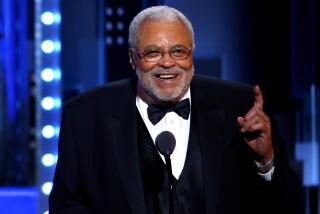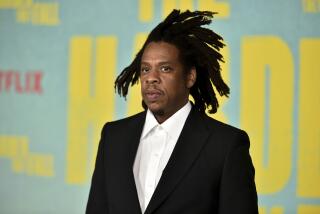The Word According to KRS-One : Lecture: The rapper-philosopher talks about common sense with an audience of Cal State Fullerton students.
- Share via
FULLERTON — KRS-One, rap’s reigning philosopher king, told an audience of students at Cal State Fullerton on Wednesday that the disease they should fear most is one he called CSDS--Common Sense Deficiency Syndrome.
“The No. 1 disease killing people is a disease of the mind,” KRS-One (real name: Kris Parker) told the crowd. “CSDS is the disease that gives us all other diseases.”
CSDS, he said, leads to the unsafe sex practices that can advance the spread of AIDS. The dearth of common sense, he continued, is at the root of crack addiction and can even explain why some women will cheer rap groups, such as N.W.A. and 2 Live Crew, that denigrate them.
“If I was to call any woman in this room a bitch or a tramp, they’d try to kill me right now. But for a $17.50 concert ticket . . .,” KRS-One said, letting the sentence trail off. “This is CSDS.”
KRS-One is the guiding force behind rap group Boogie Down Productions, which produced the trailblazing album “Criminal Minded” in 1987. The rapper moved in an increasingly philosophical vein through subsequent albums before returning to a more streetwise stance for this year’s “Sex and Violence.”
His address Wednesday centered on a theme of self-actualization but meandered through a variety of topics through about 100 minutes (plus a half-hour question-and-answer session). He set his sights high with his first sentence--”Hopefully, what I say today is going to save your natural lives”--and repeatedly called on students to reject the dogma of the education system, politics and religion and embrace a radical change in consciousness based on “truth.”
“The only solution to the education system is to find yourself,” the rapper said. “We know that our barbaric actions don’t make sense, but we tell ourselves that’s just the way it is.”
The rambling lecture circled back to several central topics, including:
* Religion: “Religion and God are totally separate. Religion is created by government. God is God.”
* The Bible: “Why do you look for a living God in a dead book?” he asked, holding up a copy of the Bible. “Everything God wants you to know is already written in your heart.”
* Voting: “The vote doesn’t work for black people at all,” he said. “What kind of voice is yes or no?”
* Government: “It’s not about the people. It’s about money and business. America is a company,” he said. And, directly addressing blacks in the room: “You have nothing to do with America. This is your plantation.”
* Revolution: “In the next five years, I see America going through a big consciousness change,” KRS-One said, adding that the mental revolution would presage a physical one. “First, you look in the mirror and change what you see.”
On the subject of racism, he said that it was not inherent, but institutional. “No child is racist,” he said. “A child is born, and then they go through the educational system.”
At one point early in the lecture, he held up a black notebook and stated: “No one in this room is this black,” holding his hand against the book for contrast. Then he opened to a blank page inside, saying: “If anyone in this room was as white as this page, they’d be dead.”
When asked point-blank if European civilization was the devil incarnate in light of European support for the slave trade and other avenues of oppression, KRS-One ascribed demonic characteristics to the European “white aristocratic male,” who justified and taught racism and oppression to the lower classes.
Thus, he said, it follows that “the majority of white people are possessed by the devil.”
During the question-answer session, KRS-One was challenged only on his position on voting. He said that although he does not vote, he is not telling others not to vote. When reminded of the words of Malcolm X (“the ballot or the bullet”), KRS-One said that while some of the black nationalist leader’s teachings remain valid, others have become obsolete.
Voting, he said, may have held some promise in Malcolm’s time, but no longer: “The ‘90s is nothing like the ‘60s.”
More to Read
Sign up for Essential California
The most important California stories and recommendations in your inbox every morning.
You may occasionally receive promotional content from the Los Angeles Times.










